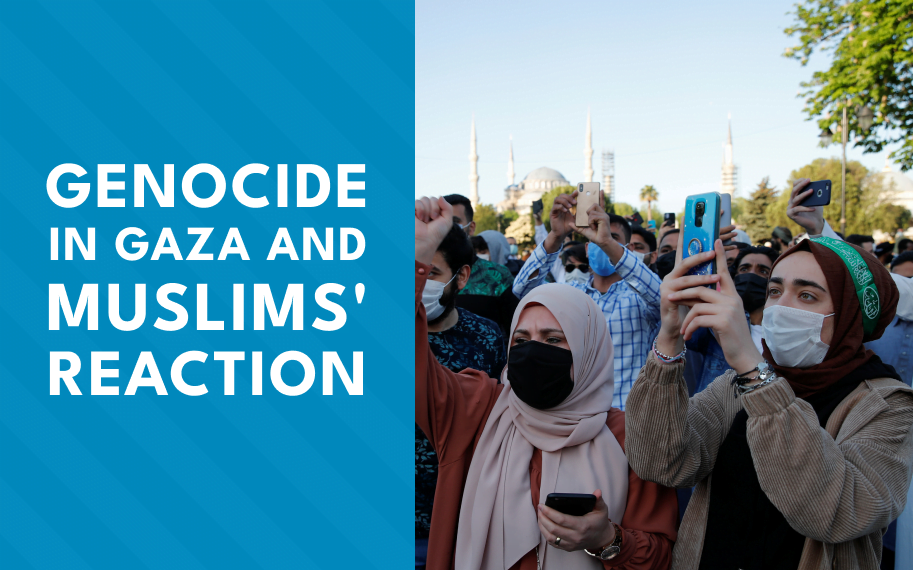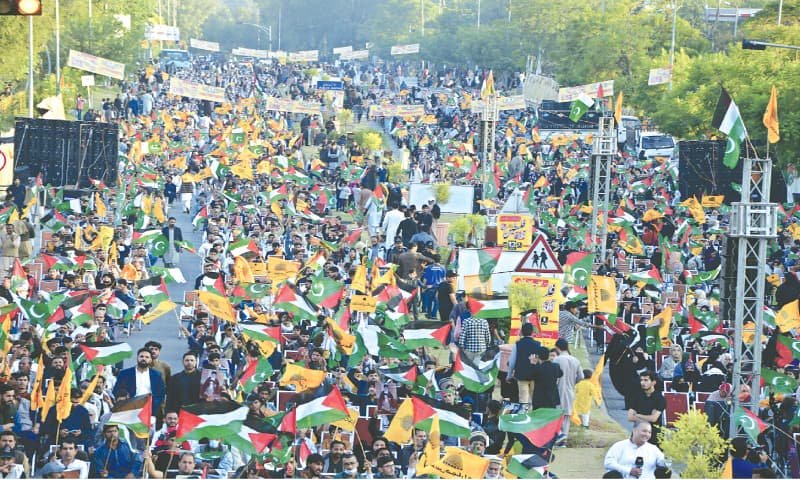
The situation in Gaza, particularly concerning the conflict between Israel and Palestine, has elicited strong reactions within the Muslim community and beyond. Here are some aspects of Muslim reactions to the Gaza conflict:
Table of Contents
Genocide in Gaza
The term “genocide” is a highly charged and legally defined concept. While some individuals and groups argue that the situation in Gaza constitutes genocide, others may use terms like “conflict,” “occupation,” or “human rights violations” to describe the complex and longstanding issues in the region.
Muslims’ Reactions
Muslims worldwide often react emotionally and passionately to the situation in Gaza due to their religious, cultural, and historical connections to the region. Here are some common reactions:
- Solidarity Protests:
- Muslims may engage in peaceful protests and demonstrations to express solidarity with the people of Gaza, condemning what they perceive as unjust actions.
- Social Media Activism:
- Many Muslims utilize social media platforms to share information, raise awareness, and express their views on the situation. Hashtags, images, and personal stories circulate to garner international attention.
- Humanitarian Aid Efforts:
- Muslims may contribute to humanitarian aid efforts, supporting organizations that provide assistance to those affected by the conflict. This includes donations for medical supplies, food, and other essential needs.
- Prayer and Spiritual Reflection:
- Muslims often engage in increased prayers, seeking peace and justice for those affected. Religious leaders may address the issue in sermons, emphasizing the importance of compassion and empathy.
- Dialogue and Advocacy:
- Muslims may engage in dialogue and advocacy efforts, both within their communities and on a broader scale. This includes reaching out to political leaders, participating in interfaith initiatives, and collaborating with human rights organizations.
- Emotional Impact:
- The situation in Gaza can evoke deep emotional responses, ranging from sadness and frustration to anger and a sense of helplessness. Individuals may turn to their faith for solace and strength during challenging times.

Diverse Perspectives
It’s essential to note that reactions within the Muslim community can be diverse. Some focus on political solutions, while others emphasize humanitarian aid and support. There are also varying opinions on the nature of the conflict and the proposed resolutions.
In essence, Muslims’ reactions to the conflict in Gaza reflect a deep sense of solidarity, humanitarian concern, and a desire for justice and peace for the people affected by the ongoing crisis.
FAQs
Q1: What is the current situation in Gaza?
A1: The current situation in Gaza involves an ongoing conflict between Israel and Palestine. The region experiences periodic escalations of violence, resulting in civilian casualties, destruction of infrastructure, and a humanitarian crisis.
Q2: Why is there a strong reaction from Muslims worldwide?
A2: Muslims worldwide feel a strong connection to the people of Gaza, considering them fellow Muslims facing what they perceive as unjust oppression. The loss of innocent lives, displacement, and the humanitarian crisis evoke emotional responses, leading to widespread solidarity and advocacy.
Q3: How are Muslims expressing their solidarity?
A3: Muslims express solidarity through various means, including peaceful protests, social media activism, humanitarian aid efforts, increased prayers, and political advocacy. These actions aim to raise awareness, demand justice, and support the affected population.
Q4: What role does social media play in Muslims’ reactions?
A4: Social media serves as a crucial platform for Muslims to share information, raise awareness, and express their views on the situation in Gaza. Hashtags, images, and personal stories circulate to mobilize support and draw international attention.
Q5: How can Muslims contribute to humanitarian aid efforts?
A5: Muslims can contribute to humanitarian aid efforts by donating to reputable organizations providing medical aid, shelter, food, and support to those affected by the conflict. This helps alleviate the suffering of the impacted population.
Q6: Are there diverse perspectives within the Muslim community?
A6: Yes, there are diverse perspectives within the Muslim community regarding the conflict in Gaza. Opinions on political solutions, the nature of the conflict, and proposed resolutions can vary based on individual beliefs, geopolitical understanding, and personal experiences.
Q7: What is the role of prayer and spirituality in Muslims’ reactions?
A7: Prayer and spirituality play a significant role as Muslims turn to increased prayers, supplications, and remembrance for the well-being of the people in Gaza. Religious leaders may also address the issue in sermons, emphasizing compassion and the duty to help those in need.
Q8: How can Muslims contribute to political advocacy?
A8: Muslims can contribute to political advocacy by engaging in diplomatic efforts, participating in political forums, petitioning governments, and advocating for policy changes that support justice, peace, and the recognition of Palestinian rights.
Read Also
Why is It Important To Learn Quran Tafsir?
Common Mistakes To Avoid When Learning The Quran
The Role of the Quran in Spiritual Development
Online Quranic Arabic Courses for Beginners
Ways to Implement the Quran in Daily Life
Benefits of Reciting Surah Mulk
Al Aqsa Mosque – History, Religious Significance & Facts
Teaching the Quran to Autistic Children

